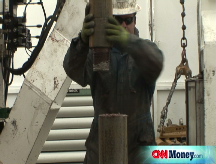Oil rebounds after selloff
After falling 50% over the last 3 months, some investors think crude's slide has gone too far.

NEW YORK (CNNMoney.com) -- The price of oil rose Friday, after slumping to a 13-month low in the previous session, as investors viewed rising stock prices as a positive sign for energy demand.
Light, sweet crude for November delivery rose $2 to settle at $71.85 a barrel on the New York Mercantile Exchange. That's down 50% from crude's July peak settlement price of $145.29 a barrel.
On Thursday, the contract settled at $69.85, the lowest level since Aug. 23, 2007.
The oil market has been dominated by concerns that a prolonged economic slowdown would curb demand for energy. But some traders now say the price of oil has been driven down too far.
"The market is very oversold," said Peter Beutel, oil industry analyst at Cameron Hanover in Connecticut. "Now that we're out of the meltdown phase, the market is starting to look ahead."
Meanwhile, stock markets in Europe and Asia rose Friday. On Wall Street, the Dow Jones industrial average was up nearly 1% with about one hour left in the session.
Many oil traders see rising stock prices as a sign that economic conditions are improving and that energy demand may recover.
At the pump, gasoline prices fell another 4 cents overnight to a national average price of $3.04 a gallon. Gas is down more than 25% after soaring to an average of $4.11 in July.
As gas prices retreat, households should have more money to spend on discretionary items. That could help speed an economic recovery since consumer spending makes up two-thirds of the nation's gross domestic product.
OPEC: The market was also digesting a surprise move Thursday by the Organization of the Petroleum Exporting Countries to hold an emergency meeting earlier than it had originally planed.
OPEC member countries control two-thirds of the world's crude supplies, and analysts say its decision belies a desire to put a floor under the rapidly declining price of crude.
"OPEC is starting to panic," Beutel said. The cartel is expected to cut production by as much as 1 million barrels a day, he added.
But Beutel thinks a production cut by OPEC will not have a significant impact on the price of oil given the current outlook for supply and demand fundamentals.
"They're going to fail at keeping the price where they want it," he said.
Credit thaw: Recent signs of progress in the credit market have also helped improve the outlook for energy demand, said Tom Pawlicki, energy analyst at MF Global in Chicago.
Credit markets have seized up as banks have become wary of lending to each other and businesses given the uncertainty about the health of the global economy.
In response, governments worldwide have stepped up efforts to reestablish confidence in the financial system and get money flowing freely again.
"There's a bit more confidence in the credit situation," Pawlicki said. "That's helping the stock market and boosting the oil market."
The overnight Libor rate fell to 1.67% from 1.94% Thursday, according to the British Bankers' Association. The key bank-to-bank lending rate is now at its lowest level since Sept. 20, 2004, when the rate was 1.66%.
Last Thursday, overnight Libor reached 5.09% and had spiked as high as 6.88% after the U.S. $700 billion bailout bill was signed into law on Oct. 3.
Funds: The oil market is also experiencing an exodus of large institutional investors.
Open interest in the market for crude futures has declined recently, suggesting that the market is seeing "a blow out of large funds," Pawlicki said.
Big firms that oversee large sums of money, including hedge and pension funds, were blamed for inflating the price of oil during the summer's run-up.
While futures markets rely on a certain degree of speculation, these funds were criticized for "excessive speculation" by government regulators and industry watchdogs.
But as the credit crunch has weighed on the financial system, many of these funds are now pulling money out. ![]()



